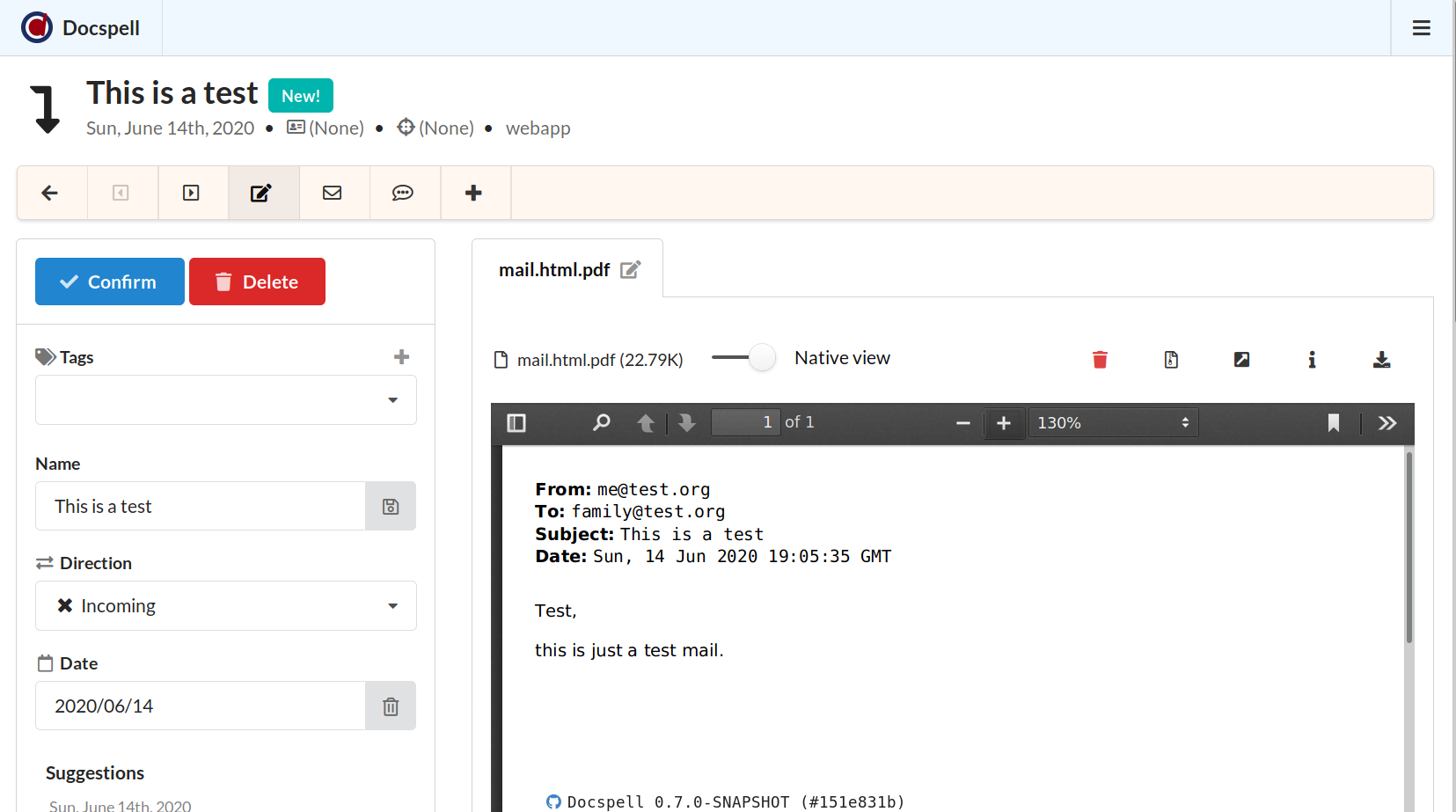SMTP Gateway with Exim🔗
One possible use case for the integration endpoint is a SMTP server that forwards all local mail to docspell. This way there is no periodic polling involved and documents (e-mails) get into docspell without delay.
The tools/exim folder contains a docker file and a sample
exim.conf to help start with this setup. Note that these files
provide a minimal setup, you might want to add tls and spam protection
when opening it to the public.
What you need🔗
You need to own a domain and add the appropriate MX records to point
to your server. In this document, the domain test.org is used.
You need to enable the integration endpoint in the docspell configuration.
Exim🔗
Exim is a popular smtp server (message transfer agent). It is used here only because of previous knowledge, but same can be achieved with other MTAs.
The Config File🔗
Here is the example config file for exim:
## Provide certificates to enable StartTLS
# tls_certificate = /var/lib/acme/test.org/fullchain.pem
# tls_privatekey = /var/lib/acme/test.org/key.pem
}
!
!
Exim has good documentation, look there for more info. The following is only a quick summary of the file above.
The domainlist local_domains should list your domain. Only mails to
this domain are allowed, as specified in the first rule in
acl_check_rcpt. So mails to name@test.org are ok, but
name@someother.org not.
Another rule in acl_check_rcpt executes a GET request against the
integration endpoint. If that fails, the recipient is wrong (or the
endpoint disabled) and the mail is rejected right away.
Then the routers define how a mail is handled. There is only one
router that accepts all mails (that have not been rejected by a rule
in acls) and uses the docspell transport to deliver it. The
transport specifies a command via the pipe driver that is run with
the mail. The mail itself is provided via stdin. So a simple curl
command can upload it to the integration endpoint. Here are some quick
notes about the used options (see man curl):
--silentand--out /dev/nulldon't print upload progress information and no output to stdout--failreturn non-zero if http status code is not success-Fuse a multipart/form-data request (defaults to a POST request)"file=@-;filename=\"$_subject:\""add one part with namefileand take the data from stdin (@-). Since there is no filename, we use the subject of the mail. This is supported by exim by expanding the subject mail header via$h_subject:(the colon is required).$local_partthis is expanded by exim to the recipient address, only the part until the@sign.${env{DS_HEADER}{$value} fail}looks up an environment variable by keyDS_HEADER. This is usually defined indocker-compose.yml. The value must be the "secret" header value as defined in docspell's configuration file.${env{DS_URL}{$value} fail}the url to docspell. It is looked up from the environment with keyDS_URL, which is usually defined indocker-compose.yml. Adding the$local_partat the end means that mails tosomename@test.orgare uploaded to the collectivesomename.
Install with Docker🔗
Go into the tools/exim directory and build the docker image:
Then start docspell somewhere and configure the integration endpoint to use http-header protection; i.e. set this in the config file:
Then edit the docker-compose.yml and change the environment
variables as needed.
Finally start the container:
Test Run🔗
Now it is possible to send mails to this MTA which will be immediatly
uploaded to docspell for the collective corresponding to the
$local_part of the recipients address. Here is a quick telnet
session (the collective is named family):
~> telnet localhost 25
Trying ::1...
Connected to localhost.
Escape character is '^]'.
220 test.org ESMTP Exim 4.93 Sun, 14 Jun 2020 19:03:51 +0000
ehlo localhost
250-test.org Hello localhost [::1]
250-SIZE 31457280
250-8BITMIME
250-PIPELINING
250-CHUNKING
250 HELP
mail from:<me@test.org>
250 OK
rcpt to:<family@test.org>
250 Accepted
data
354 Enter message, ending with "." on a line by itself
From: me@test.org
To: family@test.org
Subject: This is a test
Test,
this is just a test mail.
.
250 OK id=1jkXwf-000007-0d
quit
221 test.org closing connection
Connection closed by foreign host.
~>
The mail is processed and results in an item:

However, if a mail is to an unknown collective or not to the configured local domain, the server rejects it immediately: